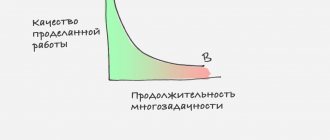Decreased attention
Sysuev Oleg Mikhailovich Neurologist
✓ Article verified by a medical expert
Decreased attention is a person’s inability to concentrate on a specific object, task, or stimulus. The problem occurs in children and adults. Absent-mindedness accumulates, leading to neurological and mental disorders. It is necessary to identify the causes in a timely manner in order to undergo treatment and avoid irreversible processes.
Types of violations
Decreased attention is a common problem that affects a person’s quality of life. Children's concentration is quite harmless, but with age the disease worsens.
Types of disorders:
- Absent-mindedness (fluttering concentration) - present in school-age children. Occurs due to lack of interest in activities.
- The inattention of a scientist” - a person stays in his thoughts for a long time, so it is difficult to switch from one process to another.
- Distraction is a constant switching from one type of activity to another. The inability to bring a single task to its logical conclusion.
- Lack of concentration in old people is the inability to shift attention due to age and neurological conditions.
- Inertia is a pathological fixation of attention. A person does not know at what time to shift attention to another object.
- Aprosexia is complete inattention.
At a certain point, the human brain stops performing tasks, being distracted from the main activity. Inattention is a violation of one of the cognitive functions.
Indeed, problems with concentration are often caused by mental stress and lack of interest. Such symptoms are not a sign of serious illness. They pass as soon as a person rests or switches to a more interesting activity. If we talk about age-related decrease in concentration, this is the cause of serious pathological disorders.
Causes and symptoms
The diagnosis of adult attention disorder is different from childhood inattention. Let's look at the main factors influencing reduced concentration:
- genetic predisposition;
- birth injuries;
- difficult childhood;
- brain dysfunction;
- hormonal disorders;
- emotional stress;
- wrong diet;
- excessive anxiety and pain.
Lack of concentration leads to depression, hyperprosexia, epilepsy, memory impairment, cognitive impairment, dementia (dementia).
Symptoms of inattention:
- Inability to focus on a subject. Characterized by “freezing” and “wandering” of attention. A person cannot concentrate on doing a certain task, misses important details, and is unable to concentrate. For example, he rereads a paragraph in a book several times without understanding what is written there.
- Restlessness is the inability to sit still. I always want to run somewhere. Because of this, there is a lack of attention and inability to concentrate.
- Impulsivity is caused by the tendency to act unconsciously (uncontrollably). Characterized by emotional people. Under the influence of external experiences, a person cannot concentrate on business.
- Fussiness is the rush to do everything quickly. A waste of time on unnecessary things. As a result, important details are missed.
- Fatigue is a symptom of increased fatigue. In such a state, a person becomes inattentive, unfocused, and depressed.
- Increased irritability is a sign of depression. The person is worried and cannot focus his gaze on one object.
- Nervous excitability is a malfunction of the nervous system. The patient instantly reacts to external events, thereby disconnecting from the main activity.
Signs of decreased attention require careful analysis. Make an appointment with a specialist and solve the problem!
Which doctor should I contact?
If you lose concentration, you need to see a neurologist. The specialist will find out the cause, make a diagnosis, and prescribe therapy. Attention disorders are difficult to study. It is necessary to conduct a detailed diagnosis of the brain. Modern equipment and devices make it possible to quickly determine the examination and treatment of inattention. The doctor will develop a health and rehabilitation program based on the individual qualities of the patient.
Diagnosis and treatment
The study of the patient begins with examining the patient and taking samples. Diagnosis of the causes of decreased attention includes modern methods:
- pathopsychological tests - test tasks with stimulus material;
- double stimulation method - diagnosis of modality-specific disorders;
- Magnetic resonance imaging;
- electroencephalography;
- angiography.
Treatment of decreased attention is based on drug therapy, which depends on the concomitant disease. Memory enhancing drugs and psychostimulants are prescribed. The sooner you address the problem, the faster and more effective your recovery will be.
Rehabilitation methods
In addition to medications, it is recommended to undergo rehabilitation procedures:
- Patients with psychological problems are prescribed psychocorrection - auto-training for emotional relief. They provide explanations on how to behave at home.
- Electrical stimulation of motor nerves is an effective way to improve attention problems.
- The patient is prescribed water treatments, in particular balneotherapy.
- A relaxing massage will improve blood circulation.
- Relaxation methods are modern relaxing activities that the patient can do at home.
- Physiotherapy. Light sports are the basis for vivacity and good mood.
In addition, measures are taken to eliminate negative relationships in the family. Psychological work with the patient is part of the health restoration program.
What you can do yourself
Cognitive function training is the main component of increasing attention. There are special programs that automatically detect the most weakened brain functions and offer a training regimen that is individually suitable for each patient.
A few rules of daily life:
- Plan your vacation. Decreased attention directly depends on fatigue and overwork. On weekends, disconnect from the hustle and bustle and put your thoughts in order.
- Get out into nature. A walk through the forest or park refreshes the brain and stimulates blood circulation.
- Cope with depression with the help of meditation, which drives away negative thoughts, anxiety, and restlessness.
- Remove objects that distract you. There is time for work - there is time for answering messages and calls.
- Perform complex and basic tasks in the morning, when you have a good energy reserve.
Improve your concentration with games and exercises. Do this during breaks from your main activity. For example, we fill a glass with water and hold it at arm’s length for 3 minutes, without being distracted by anything.
Result and lifestyle
Treatment for decreased attention yields positive results if you are patient. Prevention of loss of concentration is based on maintaining a healthy lifestyle, walking in the fresh air, eating right and giving up bad habits. Get more rest - healthy sleep improves physical activity and increases attention. Visit your doctor regularly!
The essence and types of inattention
The inability to concentrate occurs in people of all ages. There are many examples of the manifestation of such a problem in childhood and its development in adolescence and adulthood.
Psychologists define attention disorder as a violation of the direction and selectivity of mental activity, the inability to perceive information from different sources, decreased concentration and difficulty switching from one object to another.
There are three types of scattered states:
- “Fluttering attention” is characteristic of school-age children and elderly people, as well as those who are overworked and weakened by illness. With this disorder, attention is difficult to control: it is easily distracted by external stimuli and cannot be concentrated for a long time.
- “Scientist inattention” is characterized by a strong concentration on one thing or one’s thoughts. At the same time, it is difficult for a person to switch attention to other processes. People with these types of disorder are prone to obsessions.
- “Abstract-mindedness of old people” combines the two previous types: it is characterized by a weak ability to concentrate and switch. Most often it occurs in elderly people suffering from cerebral atherosclerosis, and also occurs due to constant fatigue or brain hypoxia.
Treatment of absent-mindedness
Based on the results of laboratory diagnostics, an endocrinologist will determine the presence or absence of endocrine diseases, deficiencies, and imbalances. The doctor will definitely prescribe you a course of dietary supplements, and, if necessary, hormonal and other medications. Complaints and research results can serve as a reason to refer the patient to specialized specialists: neurologist, cardiologist, psychotherapist, etc.
The person will also receive recommendations from the doctor related to nutrition, sleep and activity patterns. In order for the brain to function fully, it is necessary to eat a varied diet, drink enough water, and sleep soundly at a certain time. Our doctors are experienced specialists in normalizing the rhythm of life. By following the advice of endocrinologists at the Marina Ryabus clinic, you will get rid of problems associated with forgetfulness and inattention.
Mental and physiological reasons for the development of pathologies
The development of memory pathologies is influenced by brain diseases. These can be both degenerative processes (progressive disease) and neuroendocrine defects (congenital or acquired feature). Often the cause of the development of pathology is a psychotic disorder. Such diseases include:
- depression;
- epilepsy;
- schizophrenia;
- neurasthenia;
- neurosis.
One of the typical diseases that manifests itself in early childhood is attention deficit hyperactivity disorder. The child is not able to control his actions and stay in one place for a long time. He cannot be carried away by games or other monotonous activities. He moves chaotically, scatters toys, is capricious and often aggressive.
Problems with concentration can arise in stressful situations. More often they go away on their own as soon as the stress factor ends, but they can become chronic. In this case, treatment will be required.
How to increase concentration
To improve memory and attention you need:
- Follow a daily routine.
- Balance your diet.
- Drink the required amount of water.
- Reduce time spent in front of the TV, at the computer and on the phone.
- Ensure that you take medications aimed at improving attention and memory. For example, Esprico vitamins, which serve as a safe alternative to psychotropic substances.
- Get rid of bad habits, do not drink alcohol and drugs, stop smoking.
- Be physically active.
- Walk outside for at least 1.5 hours a day.
- Give your brain a workout: learn poetry, a foreign language, and do logic tasks every day.
In addition to solving logic puzzles, you can promote the development of new neural connections by doing ordinary things in an unusual way. For example, if you are not embarrassed, you can move around the house backwards, even on the street. Change your dominant hand when performing normal activities, such as holding a spoon when eating with your left hand if you are right-handed, and vice versa. Change your route to work, try to visit new places more often, read a book upside down, etc.
Reasons for low concentration
“I can’t concentrate, I don’t know the reason” - patients come to the doctor with this request. Correct identification of the prerequisites leading to attention disorders determines treatment tactics.
- General body fatigue and depression can contribute to absent-mindedness.
- Hormonal fluctuations during pregnancy or menopause affect mental activity.
- Impaired ability to concentrate may be the result of physical or psychological problems.
- Insufficient sleep and rest impair brain function. Since it is overloaded, mental abilities suffer. Lack of sleep is an obvious and common cause of inattention.
- Fasting and an unbalanced diet can reduce your ability to focus on anything. Hunger is a signal from the body about the need to replenish energy reserves, without which the body simply cannot function. Therefore, this feeling fills all thoughts, not allowing you to concentrate on anything else. Nutritional deficiencies also reduce brain performance.
What is attention from a psychological point of view?
Attention is a concept in cognitive psychology that represents the extent to which we process specific information that our brain receives from the environment.
Thanks to attentiveness, the subject’s successful orientation in the surrounding space is ensured, and it also ensures a complete and clear reflection in the psyche. The object of attention falls into the center of our consciousness, other elements are perceived weakly, not clearly, but at the same time the direction of our attention can change.
There are several types of attention:
- Involuntary type . While working with this type of attention, a person does not make any effort of will to concentrate, he does not even set a goal for himself.
- Arbitrary type . During this type, a person makes an effort of will to focus on a specific object.
- Postarbitrary type . During this type of attention, a decrease in volitional efforts is characteristic, but the goal of being attentive remains.
Absent-mindedness as a symptom of illness
Absent-mindedness is one of the signs of a number of diseases or other conditions associated with impaired functioning of the body. Below are examples of several diseases/conditions accompanied by absent-mindedness:
- Depression.
Many patients describe depression as a state of not wanting anything. Such depression is accompanied by inattention to the surrounding world and increased fatigue when trying to concentrate.
- Anxiety disorders.
Anxiety disorders, especially those associated with obsessive thoughts, prevent a person from paying enough attention to study, work, and other important tasks.
- Alzheimer's disease.
Patients with Alzheimer's disease experience severe problems with memory and attention. They may forget what they were told recently, not notice, not remember what is happening around them.
- Adrenal exhaustion.
This and other endocrine pathologies affect cognitive functions. They can cause forgetfulness and absent-mindedness. Often it is not elderly people who complain of memory impairment, but women of perimenopausal and menopausal age. This is due to changes occurring in a woman’s body.
- Withdrawal syndrome (with abrupt termination of taking medications).
Abruptly stopping medication can cause a deterioration in attention and concentration.
- Withdrawal syndrome in smokers
Smokers like to say that nicotine kickstarts their thinking process and helps them get their act together. When you suddenly quit smoking, your blood sugar levels drop significantly, which leads to weakness, dizziness, and inattention.
MIGUNOVA ANASTASIA ANDREEVNA
Cosmetologist
Initial consultation: RUB 4,500
Make an appointment with a doctor Instagram
VYATKINA IRINA SERGEEVNA
Gynecologist-endocrinologist
Initial consultation: RUB 8,500
Make an appointment with a doctor Instagram
KALININA EKATERINA ALEXANDROVNA
Cosmetologist
Initial consultation: RUB 4,500
Make an appointment with a doctor Instagram
KOZLOVA EKATERINA NIKOLAEVNA
Gynecologist-endocrinologist, oncologist
Initial consultation: RUB 5,000
Make an appointment with a doctor Instagram
Reviews
Tatiana
I am happy to be among your guests at the clinic, I enjoy our communication, I am grateful for your super professionalism, for giving beauty and a sense of confidence in your professional actions, protection from “age-related changes”










